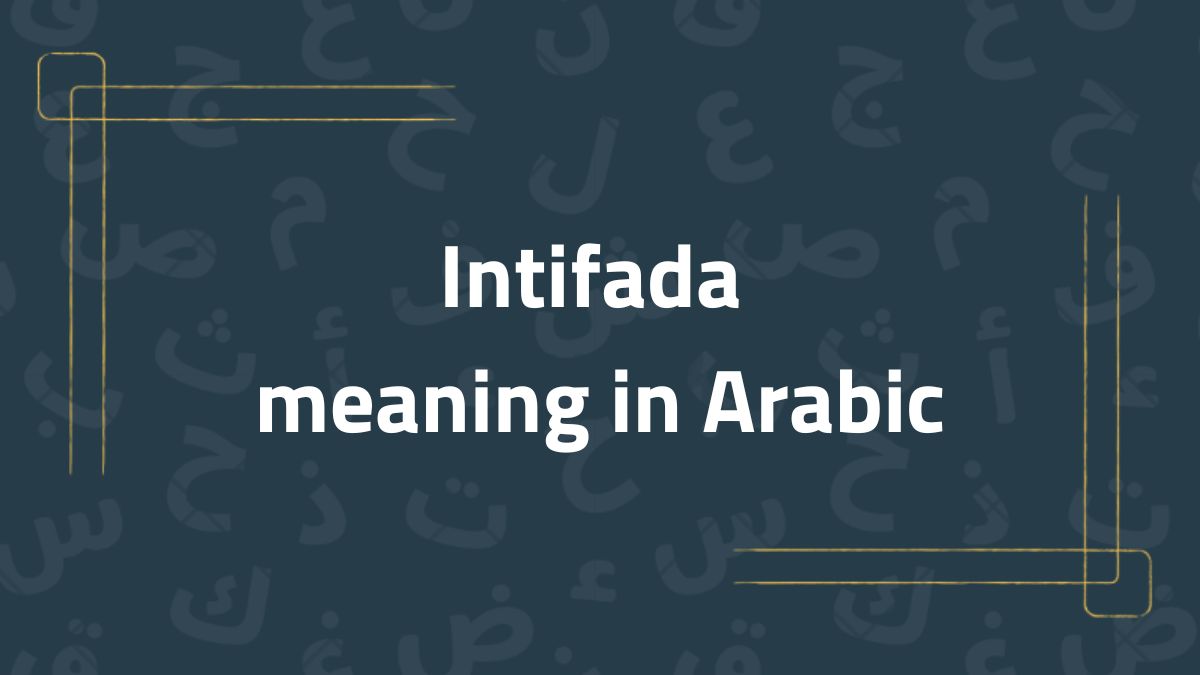The Word "Intifada" Meaning in Arabic With Examples

The Arabic word “intifada” (انتفاضة) carries deep historical and cultural significance. It is widely recognized in political and social contexts, particularly in relation to Palestinian resistance movements. This article explains the meaning of “intifada” in Arabic, its linguistic roots, usage in sentences, and cultural importance.
The Meaning of “Intifada” in Arabic
The word “intifada” translates to “uprising” or “shaking off” in English. It comes from the Arabic root ن-ف-ض (N-F-Ḍ), which conveys the idea of shaking, removing, or rising up. The pronunciation is “in-ti-faa-da” with emphasis on the second syllable.
Linguistic Root and Grammatical Usage
The root ن-ف-ض (N-F-Ḍ) appears in various Arabic words related to movement and resistance. “Intifada” is a verbal noun (masdar) derived from the verb انتفض (intafada), meaning “to shake off” or “to rise up.”
Grammatically, “intifada” is a feminine noun and can take different forms based on sentence structure:
-
الانتفاضة الفلسطينية (The Palestinian Intifada)
-
انتفاضة الشعب (The people’s uprising)
Examples of “Intifada” in Arabic Sentences
-
اندلعت الانتفاضة ضد الاحتلال.
(The intifada broke out against the occupation.) -
كانت انتفاضة عام 1987 نقطة تحول.
(The 1987 intifada was a turning point.) -
الشباب يشاركون في الانتفاضة السلمية.
(The youth are participating in the peaceful uprising.)
Cultural or Quranic Significance of “Intifada”
While “intifada” does not appear in the Quran, the root ن-ف-ض (N-F-Ḍ) is found in classical Arabic with meanings related to shaking or removing something. The term gained modern prominence during the First Intifada (1987–1993) and Second Intifada (2000–2005), symbolizing Palestinian resistance.
Common Misunderstandings or Mistakes
-
Some confuse “intifada” with “thawra” (ثورة), which means “revolution.” While both imply resistance, “intifada” specifically refers to an uprising or shaking off oppression.
-
Learners may mispronounce it as “in-ti-fa-da” instead of the correct “in-ti-faa-da.”
Why You Should Learn “Intifada”
Understanding “intifada” helps in grasping modern Arabic political discourse and historical events. It is useful for students of Middle Eastern studies, journalists, and Arabic learners focusing on current affairs.
Conclusion
The word “intifada” means “uprising” or “shaking off” in Arabic. It holds historical weight, particularly in Palestinian resistance movements. By learning its meaning, root, and usage, Arabic students gain insight into both language and culture. Whether studying modern history or improving vocabulary, “intifada” is a key term to know.
By covering variations like “intifada meaning in Arabic,” “what does intifada mean,” and “intifada in Arabic to English,” this article ensures clarity for readers searching for this term.
Discover the Quran and Arabic with Shaykhi Academy
We highly recommend Shaykhi Academy for anyone seeking to learn the Quran and Arabic with excellence. The academy is known for combining expert teaching with a compassionate approach, making it a top choice for students worldwide who want to connect deeply with the words of Allah.
At Shaykhi Academy, you’ll find highly qualified teachers who specialize in guiding learners of all ages and levels. Whether you’re just beginning your journey with Arabic letters or aiming to master Tajweed and Quran recitation, their personalized lessons ensure steady progress at your own pace.
With engaging classes, flexible scheduling, and a focus on both spiritual and linguistic growth, Shaykhi Academy makes learning both enjoyable and impactful.
Watch a sample class below to see Shaykhi Academy in action:
Learn Arabic, Quran, And Tajweed With Free Trial!
Make your home a place of faith, understanding, and connection with the Quran. Whether you're starting from scratch or deepening your knowledge, Shaykhi Academy is here to guide you — step by step. ✅ Tailored for all ages ✅ Clear, structured learning ✅ Flexible online sessions ✅ Book your free trial session now!
Learn More
